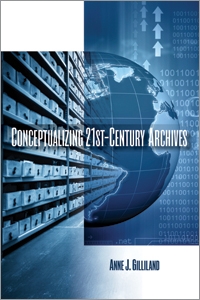
Primary tabs
You don't need to be an ALA Member to purchase from the ALA Store, but you'll be asked to create an online account/profile during checkout to proceed. This Web Account is for both Members and non-Members. Note that your ALA Member discount will be applied at the final step of the checkout process.
If you are Tax-Exempt, please verify that your account is currently set up as exempt before placing your order, as our new fulfillment center will need current documentation. Learn how to verify here.
- Description
- Table of Contents
- About the author
- Reviews
The digital age has spurred constant technological and sociocultural change. In Conceptualizing 21st-Century Archives, author Anne J. Gilliland explores the shifts and divergences in archival discourse that technological developments have necessitated, facilitated, or inspired. Gilliland addresses the lessons the archival and recordkeeping fields can learn from their evolution about ideas tried and abandoned; which ideas are truly new, and which continue to hold good, regardless of technological shifts; and the ways in which archivists need to expand their thinking and practices to fulfill their global and local--"glocal"--roles.
By understanding how archival practices and thinking were challenged or how archivists responded at different points over the past century, the reader can begin to discern how and why ideas rise, fall, and resurge. The book traces the development of descriptive systems, the creation and management of computer-generated records, and the curation of digital materials. With each chapter, Gilliland addresses either the historical development or the current state of an area within archival science that information and communications technology have significantly affected to ultimately construct a picture of how archives arrived in the 21st century and to suggest where they might be going in the foreseeable future.
View the Table of Contents now!
Anne J. Gilliland
Anne J. Gilliland, Associate Professor, Department of Information Studies, University of California, Los Angeles, conducts research and teaches in the areas of electronic records management, the design and evaluation of information systems containing primary sources, and archival education. She has an MA from Trinity College Dublin, an MS and CAS from the University of Illinois at Urbana-Champaign, and a Ph.D. from the University of Michigan. She is a Fellow of the Society of American Archivists, and a recipient of the Society’s C.F.W. Coker Award and the Midwest Archives Conference Margaret Cross Norton Award.
"[Gilliland] is quite adept at explaining concepts and summarizing historical developments. Her book focuses in a refreshing way on the impact that technological changes have had on archival discourse: assessing what has truly changed or may need to change by tracing the lineage of archival paradigms, models and innovations."
— Archives and Manuscripts (Australia)
"Partly a history, partly a conceptual framework, partly a synopsis of practice and standards, the book acts as a textbook for graduate students, a means by which mid-career archivists can update themselves, and a vehicle for opening up a conversation about archival values with other communities of practice, especially in the digital domain."
— Archivaria: The Journal of the Association of Canadian Archivists
"We can be a profession so rooted in practice and focused on day-to-day challenges and opportunities, that we do not take the time to look at the collective set of experiences other professionals and archival thinkers have shared. Thankfully, Anne Gilliland combats this historical amnesia by looking deeply at the history of international archival practice and asking what we can learn from our past as we plan for our future in a rapidly evolving information landscape."
— Metropolitan Archivist
"Overall, this book is a thorough blend of the history of recordkeeping, present practice, and thought-provoking speculation about its future, and is essential reading for both archives professionals and students alike."
— New England Archivists Newsletter


